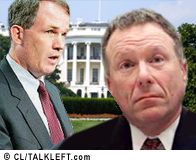He argues that he needs the requested documents both to refute the government's case and to prepare his own case.
Now for the factual goodies in the pleading: First up is former DIA spokesperson Bill Harlow, whom Libby says was the source for Cathie Martin.
To use one potential defense witness to illustrate the nature of the documents we seek, the defense may call Bill Harlow, the CIA's former spokesperson, as a witness. Mr. Harlow is an important player in the events described in the Indictment. We believe that Mr. Harlow is referred to in the indictment as the government official who disclosed Ms. Wilson's employment status to Cathie Martin, former Assistant to the Vice President for Public Affairs. See Indictment, Count One, ¶ 18. Mr. Harlow may be called to testify about that conversation and about whether he told her that such information was secret. Such testimony would support the defense's contention that Ms. Martin did not tell Mr. Libby that Ms. Wilson's employment at the CIA was classified, which would help the defense to contest the government's argument that Mr. Libby should have known such information was classified.
Libby argues:
Any documents relating to Mr. Harlow that discuss Mr. Wilson's trip to Niger, and that were created, sent, or received by him after May 6, 2003, are well within the scope of Rule 16 as this Circuit has defined it, regardless of whether the government or the defense calls him at trial.
Libby says the Government's chief witnesses regarding the allegation he lied about where he learned about Plame's employment are:
These witnesses and alleged conversation dates include: (1) Under Secretary of State Marc Grossman (June 11 or 12); (2) CIA official Robert Grenier (June 11); (3) CIA briefer Craig Schmall (June 14); (4) White House Press Secretary Ari Fleischer (July 7); (5) Counsel to the Vice President David Addington (July 8); and (6) Cathie Martin (on or before July 8).
Two classfied e-mails are germane to the case.
Further, at oral argument, defense counsel brought two classified e-mail messages to the Court's attention to provide illustrations of how certain of the few documents the government has produced so far are highly relevant to our defenses. Because we could not discuss classified information in open court, we have filed a sealed declaration to describe the materiality of these documents to the Court. See Sealed Declaration of Theodore V. Wells, Jr., dated May 12, 2006. We believe that the government possesses many other such material documents and that those documents are called for by the requests in our Motion.
Libby narrows and identifies issues.
....we expect the government to attempt to prove that one or more government witnesses who allegedly discussed Ms. Wilson with Mr. Libby conveyed to him that her affiliation with the CIA was a secret. A key part of the defense will be that these government witnesses either did not know that Ms. Wilson's employment status was classified, or did not communicate such information to Mr. Libby.
There's another veiled credibility attack on Marc Grossman:
Second, and more importantly, documents that contain neither exculpatory nor impeachment information may nevertheless be extremely helpful to the defense; they may help the defense to identify other witnesses, find additional admissible documents, and learn what testimony to elicit or avoid. To present just one example, information showing that Mr. Grossman had a close relationship with Mr. Wilson and/or his wife does not necessarily constitute exculpatory or impeachment material, but discovering such information would help the defense develop a potentially fruitful line of cross examination for Mr. Grossman.
In other Libby news, the hearing on Libby's subpoenas to reporters is still set for Tuesday, May 16 at 1:30 pm.
Background on the issue is here. The transcript of the May 5 hearing is here.




